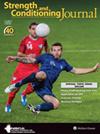阻力训练导致的力量发展速度的增加在训练停止期间保持:一项荟萃分析
IF 3
4区 医学
Q2 SPORT SCIENCES
引用次数: 1
摘要
本荟萃分析研究了阻力训练对增加力量发展速率(RFD)的影响,随后探讨了停止训练期间RFD发生的变化。检索了五个数据库以找到符合条件的研究。使用Downs和Black检查表对其方法学质量进行评估。这些数据汇集在随机效应荟萃分析中。meta分析包括7项研究和11个训练组。所有的研究都被分类为良好或中等质量。阻力训练增加RFD (d: 0.24;95%可信区间[CI]: 0.09-0.38)。干预后和训练后的RFD无显著差异(d: - 0.02;95% ci:−0.10-0.06)。在亚组荟萃分析中,根据去训练持续时间(长达4周vs 7-16周)或参与者的训练状态(未训练vs训练)进行分类,干预后和训练后RFD之间没有显著差异(p < 0.05)。这项荟萃分析表明,阻力训练有效地增加了RFD。更重要的是,结果还表明,在去训练后,RFD的收益仍保持不变。因此,与其他一些阻力训练诱导的适应(例如,肌肉力量和肌肉耐力的增加)不同,RFD的增加似乎在去训练阶段得到保留。本文章由计算机程序翻译,如有差异,请以英文原文为准。
Resistance Training–Induced Gains in Rate of Force Development Are Maintained During Training Cessation: A Meta-Analysis
ABSTRACT The present meta-analysis examined the effects of resistance training on increasing the rate of force development (RFD), followed by exploring the changes in RFD occurring during training cessation. Five databases were searched to find eligible studies. Their methodological quality was evaluated using the Downs and Black checklist. The data were pooled in a random-effects meta-analysis. Seven studies with 11 training groups were included in the meta-analysis. All studies were classified as being of good or moderate quality. Resistance training increased RFD (d: 0.24; 95% confidence interval [CI]: 0.09–0.38). There was no significant difference in RFD between the postintervention and postdetraining periods (d: −0.02; 95% CI: −0.10–0.06). In subgroup meta-analyses, there was no significant difference (all p > 0.05) between the postintervention and postdetraining RFD when categorized according to detraining duration (up to 4 weeks versus 7–16 weeks) or participants' training status (untrained versus trained). This meta-analysis demonstrated that resistance training effectively increases RFD. More importantly, the results also indicated that gains in RFD are maintained after detraining. Thus, unlike a few other resistance training–induced adaptations (e.g., increases in muscular strength and muscular endurance), it seems that gains in RFD are preserved during a detraining phase.
求助全文
通过发布文献求助,成功后即可免费获取论文全文。
去求助
来源期刊

Strength and Conditioning Journal
社会科学-运动科学
CiteScore
4.70
自引率
8.00%
发文量
49
审稿时长
6-12 weeks
期刊介绍:
Strength and Conditioning Journal is the professional journal for strength coaches, personal trainers, physical therapists, athletic trainers, and other health professionals working in the strength and conditioning field. The journal’s mission is to publish articles that report both the practical applications of research findings and the knowledge gained by experienced professionals.
 求助内容:
求助内容: 应助结果提醒方式:
应助结果提醒方式:


